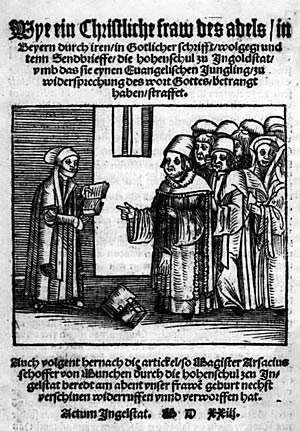Readings:
Judges 4:4-9
Psalm 118:19–29
James 2:8-13
Matthew 7:24–29Preface of a Saint (1)
PRAYER (traditional language)
Almighty God, who didst give to thy servant Argula von Grumbach a spirit of wisdom and power to love thy Word and to boldly draw others unto its truth: Pour out that same spirit upon us, that we, knowing and loving thy Holy Word, may be unashamed of Christ and may not sin against the Holy Spirit that is within us, Amen.
PRAYER (contemporary language)
Almighty God, who gave your servant Argula von Grumbach a spirit of wisdom and power to love your Word and to boldly draw others to its truth: Pour out that same spirit upon us, that we, knowing and loving your Holy Word, may be unashamed of Christ and may not sin against the Holy Spirit that is within us. Amen.
Lessons revised at General Convention 2024
Return to Lectionary Home Page
Webmaster: Charles Wohlers
Last updated: 9 July 2024
ARGULA VON GRUMBACH
SCHOLAR AND CHURCH REFORMER, c. 1554
 Argula von Grumbach née von Stauff (1492-c. 1554) was a Bavarian writer and noblewoman who, starting in the early 1520s, became involved in the Protestant Reformation debates going on in Germany. She became the first Protestant woman writer, publishing letters and poems promoting and defending Martin Luther as well as his co-worker Philip Melanchthon and other Protestant groups. She is most known for directly challenging the University of Ingolstadt's faculty when she wrote a letter to them speaking out against the arrest of a Lutheran student. As one of the few women at the time openly speaking out her views, her writings sparked controversy and often became bestsellers, with tens of thousands of copies of her letters and poems circulating within a few years of their publication.
Argula von Grumbach née von Stauff (1492-c. 1554) was a Bavarian writer and noblewoman who, starting in the early 1520s, became involved in the Protestant Reformation debates going on in Germany. She became the first Protestant woman writer, publishing letters and poems promoting and defending Martin Luther as well as his co-worker Philip Melanchthon and other Protestant groups. She is most known for directly challenging the University of Ingolstadt's faculty when she wrote a letter to them speaking out against the arrest of a Lutheran student. As one of the few women at the time openly speaking out her views, her writings sparked controversy and often became bestsellers, with tens of thousands of copies of her letters and poems circulating within a few years of their publication.
Argula von Grumbach was born as Argula von Stauff near Regensburg, Bavaria, iin a family who was among the pre-eminent leaders of Bavarian nobility.
Argula is thought to have learned to read fluently at a very young age. When she was ten, her father gave her an expensive and beautifully crafted Koberger Bible in German, despite Franciscan preachers discouraging it, saying Scripture would “only confuse her.” She became an avid student of the Bible, memorizing much of its contents.
In 1515 Argula married Friedrich von Grumbach. He is thought to have had poor health, as he died in 1530. With him Argula had four children, George, Hans Georg, Gottfried and Apollonia. The only child to survive his parents was Gottfried.
Argula become a follower of Luther and had begun a correspondence with Luther and other similar-thinking Protestants.
Bavarian authorities had forbidden reception of Lutheran ideas at the time, and the city of Ingolstadt enforced that mandate. In 1523, Arsacius Seehofer, a young teacher was arrested for Protestant views and forced to recant. The incident would have occurred quietly, but Argula, outraged over it, wrote what was to become her best-known epistle, a letter to the faculty of the university objecting to Seehofer's arrest and exile. The letter urged the university to follow Scripture, not Roman traditions. It also said she had decided to speak out even though she was a woman because no one else would.
Her letter, which was turned into a booklet, provoked a huge reaction, greatly angering the theologians and became nearly an overnight sensation. It went through fourteen editions in two months, and became a bestseller. Argula wrote more letters and copies of the first one to other significant figures.
Unable to control the spread of her ideas, theologians wanted Argula punished, and her husband lost his position at Dietfurt over the controversy. Argula was also called by many offensive epithets by her critics. Argula wrote poems in response to the slander of her, and she continued corresponding with Luther and other Reformers.
Argula was highly controversial, shunned by some of her own family, but she also had admirers for her writings. Although her challenges to the university were largely ignored, and her efforts to promote her Protestant beliefs unsuccessful, Argula was undeterred, continuing writing pamphlets. She engaged in other exceptional activities in this cause, like traveled alone to Nuremberg — which was unheard of for women at that time — to encourage German princes to accept Reformation principles.